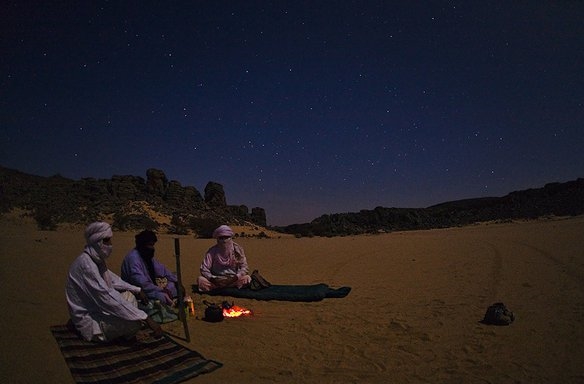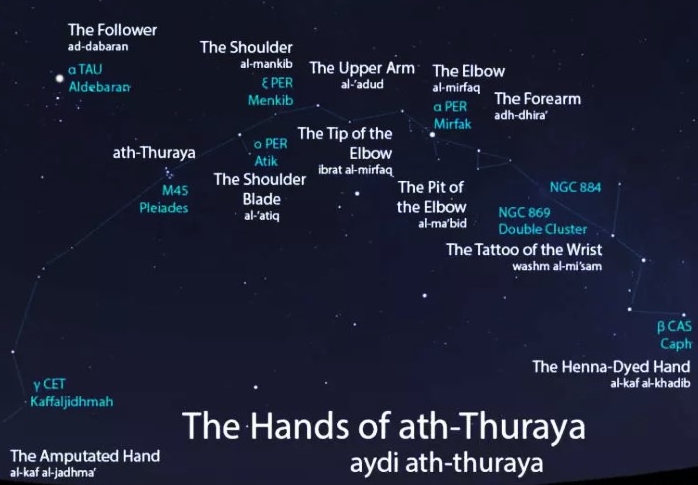
Take a moment and try to imagine yourself travelling from place to another by walking in the middle of the desert. As it starts to get dark, you have no place to sleep in but to lie down on the silky sand ground beneath you. Once you are lying down, you are facing the dark night sky sparkled by countless number of mysterious stars that attract your curiosity and pull your imagination toward the depth of the universe. This is what Arab travelers used to experience thousands of years ago. They highly appreciated the night sky since it was their roof and the stars were their guidance. The deep night sky inspired Arab’s writings, poems, music, philosophy and science.
Poems and Language
Each corner of the night sky inspired Arabs’ minds with its unique beauty. Every star shines in different colors from reds to silver blues creating a fascinating harmony surrounding the moon. Arabs used to call the moon the longtime companion ‘Rafeeq Aldarb’. Moreover, the full moon ‘Albadr’ has always been described as the most beautiful and complete image of the moon. Therefore, the moon and its light has become a symbol of beauty in the Arabic language, metaphors and poems. For example, this verse of a very famous poem written by Abū Dhuʾayb al–Hudhalī to his lover as he describes her beautiful face by saying that it is like a bright moon that is always complete.
.
البَدر يَكمُل كل شَهْرٍ مَرةً .. وهِلالُ وجْهِك كُل يَومٍ كامِل
The moon becomes full once every month..
And your moon like face is always complete
Arabic language is a logical language. It contains huge amount of poetry heritage throughout the history. Someone once told me that Arabic poetry is a piece of art and mathematics combined. Because every verse has the same number of letters and built on the same rhythm. There is a meaning hidden in every verse that you need to figure out. Arab poets used poetry in drawing their lifestyle back then, and how they used to compete with one another, and praise their courageous or generous people. Poetry even informed us about their geographical environment, social events and love stories. Here is an example of a poem verses written by Abū Hilāl al-Askarī.
.
أراعي نجومَ الليل وهي كأنهـا .. نواظر ترنو من براقع سنـدسِ
كأنَّ الثريا فيهِ بـاقة نـرجـس .. وما حولها منهنَّ طاقاتُ نرجسِ
.
I watch the stars of the night as if
there are bright eyes looking from a silky cloth
It is like a Thuraya* in a bouquet of narcissus
And it is surrounded by garland of narcissuses
Beliefs and Astronomy
A lot of Arabs believed that there are no two identical stars in the universe nor there are two totally identical people on earth. Each person as they are born have their own star in the sky that gives them their own special attraction energy which makes each individual different from the other.My father grew up in a village in Yemen called Yafa. Some people in Yafa carried this belief up till this day. My name is Sarah Naji Naji Alesayi, and I remember when I started my first year of school a lot of students in my class used to ask me why did my father and my grandfather have the same name. Who names his son after himself? I ran to ask my father, and he told me that back when his mother used to get pregnant of boys, she kept having miscarriages, and that they were told that if they name their son after grandfather’s name then the boy will live. Because if the father and son share the same name that makes them share the same star in the sky, and so he did. At first, I thought this sounded like one of those silly myths but thinking about it now, 60 years ago people still believed that every person has their own star in the sky.
Arab’s curiosity reached the deepest sky, so they studied Astronomy during the Islamic Golden era and made important discoveries and observations. They discovered many twinkling stars and named them to easily verify location and destination. This is why more than 200 bright stars in the sky have Arabic names like Leo’s Denebola, which comes from the Arabic word )Dhanab(ذنب , meaning ‘the lion’s tail’, and brightest orange colored star in Taurus named)Aldebaran (الدبران which means ‘the follower’.
.

When I was 11, we went to visit my grandfather in Yemen specifically in Yafa. I remember that my first night there was horrifying because the darkness of the night was absolutely black. There were no lights in the whole village except inside houses, and they tend to not use electricity a lot and save it as much as they can, so we would all gather and sit in one room until late then go to our rooms to sleep. Every night I used to get scared and run to my parents. However, I remember this one night my father suggested that we sleep at the open roof top of grandfather’s tall house inside a tent he built for us. This experience was new to me, so I could not expect what I would experience until I lay down my back and started to look at the sky for hours. I was quietly mesmerized by the beauty of the night sky that is filled with stars. I fell in love with God’s creation.
In the end, when you look up at the night sky, give your eyes time to adjust to the dark and observe the beauty of the night sky, and I hope after reading this you also consider the great heritage of Arabian astronomy that endures to this day.
____________________________________________________________________
*Al-Thuraya means the chandelier and it is the name of a bright star.
